红字中丁梅斯代尔最后认罪的必要性(英文)
经典名著《红字》第二十四章节选阅读翻译
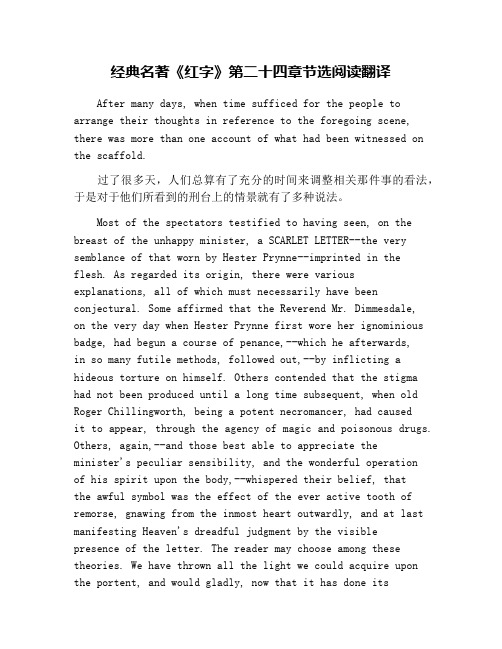
经典名著《红字》第二十四章节选阅读翻译After many days, when time sufficed for the people to arrange their thoughts in reference to the foregoing scene, there was more than one account of what had been witnessed on the scaffold.过了很多天,人们总算有了充分的时间来调整相关那件事的看法,于是对于他们所看到的刑台上的情景就有了多种说法。
Most of the spectators testified to having seen, on the breast of the unhappy minister, a SCARLET LETTER--the very semblance of that worn by Hester Prynne--imprinted in the flesh. As regarded its origin, there were various explanations, all of which must necessarily have been conjectural. Some affirmed that the Reverend Mr. Dimmesdale,on the very day when Hester Prynne first wore her ignominious badge, had begun a course of penance,--which he afterwards,in so many futile methods, followed out,--by inflicting a hideous torture on himself. Others contended that the stigma had not been produced until a long time subsequent, when old Roger Chillingworth, being a potent necromancer, had causedit to appear, through the agency of magic and poisonous drugs. Others, again,--and those best able to appreciate theminister's peculiar sensibility, and the wonderful operationof his spirit upon the body,--whispered their belief, thatthe awful symbol was the effect of the ever active tooth of remorse, gnawing from the inmost heart outwardly, and at last manifesting Heaven's dreadful judgment by the visiblepresence of the letter. The reader may choose among these theories. We have thrown all the light we could acquire upon the portent, and would gladly, now that it has done itsoffice, erase its deep print out of our own brain; where long meditation has fixed it in very undesirable distinctness.很多在场的人断言,他们在那个不幸的牧师的胸前看到了一个嵌在肉里的红字,与海丝特·白兰所佩戴的十分相似。
人性与信仰的张力——《红字》中丁梅斯代尔救赎历程的认知阐释
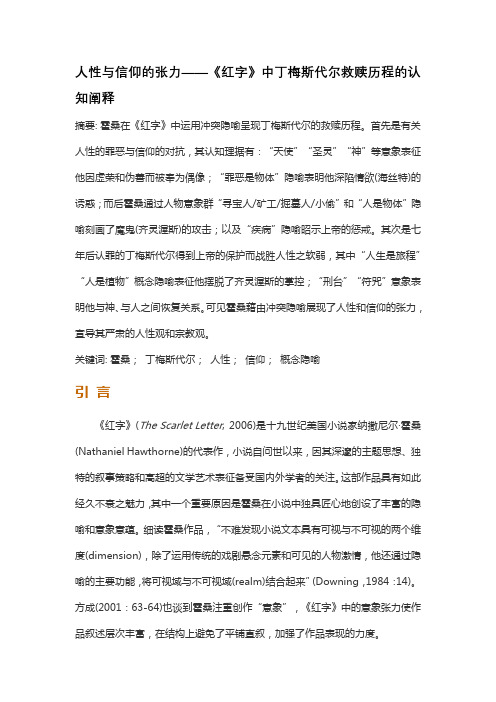
人性与信仰的张力——《红字》中丁梅斯代尔救赎历程的认知阐释摘要:霍桑在《红字》中运用冲突隐喻呈现丁梅斯代尔的救赎历程。
首先是有关人性的罪恶与信仰的对抗,其认知理据有:“天使”“圣灵”“神”等意象表征他因虚荣和伪善而被奉为偶像;“罪恶是物体”隐喻表明他深陷情欲(海丝特)的诱惑;而后霍桑通过人物意象群“寻宝人/矿工/掘墓人/小偷”和“人是物体”隐喻刻画了魔鬼(齐灵渥斯)的攻击;以及“疾病”隐喻昭示上帝的惩戒。
其次是七年后认罪的丁梅斯代尔得到上帝的保护而战胜人性之软弱,其中“人生是旅程”“人是植物”概念隐喻表征他摆脱了齐灵渥斯的掌控;“刑台”“符咒”意象表明他与神、与人之间恢复关系。
可见霍桑藉由冲突隐喻展现了人性和信仰的张力,宣导其严肃的人性观和宗教观。
关键词:霍桑;丁梅斯代尔;人性;信仰;概念隐喻引言《红字》(The Scarlet Letter, 2006)是十九世纪美国小说家纳撒尼尔·霍桑(Nathaniel Hawthorne)的代表作,小说自问世以来,因其深邃的主题思想、独特的叙事策略和高超的文学艺术表征备受国内外学者的关注。
这部作品具有如此经久不衰之魅力,其中一个重要原因是霍桑在小说中独具匠心地创设了丰富的隐喻和意象意蕴。
细读霍桑作品,“不难发现小说文本具有可视与不可视的两个维度(dimension),除了运用传统的戏剧悬念元素和可见的人物激情,他还通过隐喻的主要功能,将可视域与不可视域(realm)结合起来”(Downing,1984:14)。
方成(2001:63-64)也谈到霍桑注重创作“意象”,《红字》中的意象张力使作品叙述层次丰富,在结构上避免了平铺直叙,加强了作品表现的力度。
随着认知语言学的兴起,国内外学者对《红字》中隐喻与意象有所论述,但主要针对某一特定隐喻或意象进行个案分析,包括小说中红字“A”的隐喻和人名隐喻(这类文章较多,此处不列举),以及自然环境意象,比如阳光意象、森林意象(倪灵,2003;高湉湉,2008);荒野意象(杨金才,2000;刘国枝、郑庆庆,2004);以及镜子意象(Lasser, 1967;毛凌滢,2011)和针线意象(陈榕,2007;Powell, 2011)。
丁梅斯代尔的忏悔与救赎——霍桑的《红字》
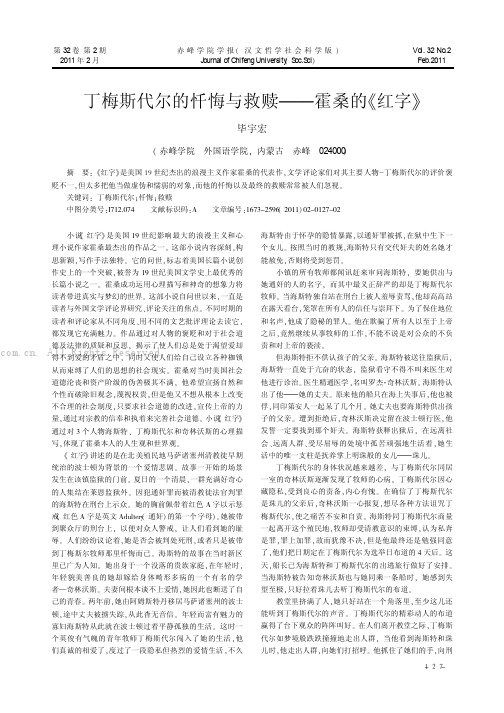
Vo l.32No .2Feb.2011第32卷第2期2011年2月赤峰学院学报(汉文哲学社会科学版)J o urnal of C hifeng University (S o c.S ci )小说《红字》是美国19世纪影响最大的浪漫主义和心理小说作家霍桑最杰出的作品之一。
这部小说内容深刻,构思新颖,写作手法独特。
它的问世,标志着美国长篇小说创作史上的一个突破,被誉为19世纪美国文学史上最优秀的长篇小说之一。
霍桑成功运用心理描写和神奇的想象力将读者带进真实与梦幻的世界。
这部小说自问世以来,一直是读者与外国文学评论界研究、评论关注的焦点。
不同时期的读者和评论家从不同角度、用不同的文艺批评理论去读它,都发现它充满魅力。
作品通过对人物的褒贬和对于社会道德及法律的质疑和反思,揭示了使人们总是处于渴望爱却得不到爱的矛盾之中,同时又使人们给自己设立各种枷锁从而束缚了人们的思想的社会现实。
霍桑对当时美国社会道德沦丧和资产阶级的伪善极其不满,他希望宣扬自然和个性而破除旧观念,蔑视权贵,但是他又不想从根本上改变不合理的社会制度,只要求社会道德的改进,宣传上帝的力量,通过对宗教的信奉和执着来完善社会道德。
小说《红字》通过对3个人物海斯特、丁梅斯代尔和奇林沃斯的心理描写,体现了霍桑本人的人生观和世界观。
《红字》讲述的是在北美殖民地马萨诸塞州清教徒早期统治的波士顿为背景的一个爱情悲剧。
故事一开始的场景发生在该镇监狱的门前。
夏日的一个清晨,一群充满好奇心的人集结在莱恩监狱外。
因犯通奸罪而被清教徒法官判罪的海斯特在刑台上示众。
她的胸前佩带着红色A 字以示惩戒(红色A 字是英文Adultery (通奸)的第一个字母)。
她被带到聚众厅的刑台上,以便对众人警戒,让人们看到她的耻辱。
人们纷纷议论着,她是否会被判处死刑,或者只是被带到丁梅斯尔牧师那里忏悔而已。
海斯特的故事在当时新区里已广为人知。
她出身于一个没落的贵族家庭,在年轻时,年轻貌美善良的她却嫁给身体畸形多病的一个有名的学者—奇林沃斯。
《红字》中字母“A”及人名的象征意义
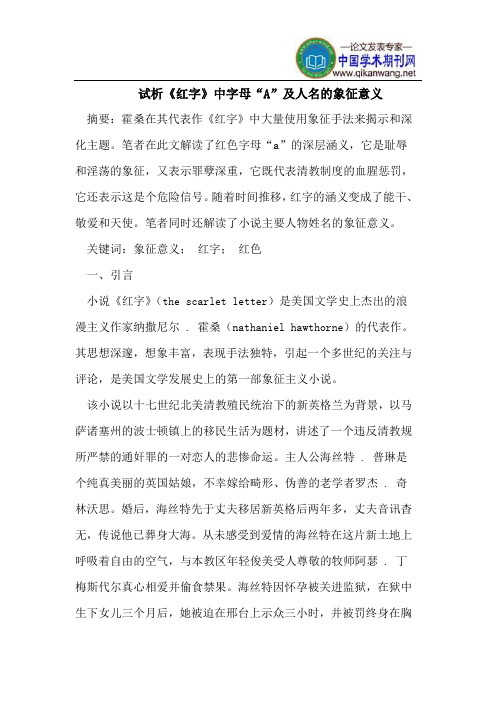
试析《红字》中字母“A”及人名的象征意义摘要:霍桑在其代表作《红字》中大量使用象征手法来揭示和深化主题。
笔者在此文解读了红色字母“a”的深层涵义,它是耻辱和淫荡的象征,又表示罪孽深重,它既代表清教制度的血腥惩罚,它还表示这是个危险信号。
随着时间推移,红字的涵义变成了能干、敬爱和天使。
笔者同时还解读了小说主要人物姓名的象征意义。
关键词:象征意义;红字;红色一、引言小说《红字》(the scarlet letter)是美国文学史上杰出的浪漫主义作家纳撒尼尔 . 霍桑(nathaniel hawthorne)的代表作。
其思想深邃,想象丰富,表现手法独特,引起一个多世纪的关注与评论,是美国文学发展史上的第一部象征主义小说。
该小说以十七世纪北美清教殖民统治下的新英格兰为背景,以马萨诸塞州的波士顿镇上的移民生活为题材,讲述了一个违反清教规所严禁的通奸罪的一对恋人的悲惨命运。
主人公海丝特 . 普琳是个纯真美丽的英国姑娘,不幸嫁给畸形、伪善的老学者罗杰 . 奇林沃思。
婚后,海丝特先于丈夫移居新英格后两年多,丈夫音讯杳无,传说他已葬身大海。
从未感受到爱情的海丝特在这片新土地上呼吸着自由的空气,与本教区年轻俊美受人尊敬的牧师阿瑟 . 丁梅斯代尔真心相爱并偷食禁果。
海丝特因怀孕被关进监狱,在狱中生下女儿三个月后,她被迫在邢台上示众三小时,并被罚终身在胸前佩带红色字母“a”。
她独自一人抚养女儿,尝尽了世人的白眼、侮辱和折磨。
丁梅斯代尔由于对上帝的迷信以及怯弱的性格,在信仰和良心的折磨中身心衰竭离开人世。
才华横溢的浪漫主义作家霍桑具有深邃、敏锐的洞察力和超人的想象力,他不仅擅长细致入微地剖析人物心理,展现人物丰富多彩、矛盾重重的内心世界,还在小说中大量运用象征主义手法,以物寓意,使得小说取得巨大成功。
笔者将在此文把红字与颜色的象征意义结合起来进行解读。
二.象征的涵义象征是艺术创作的基本手法之一。
指借助于某一具体事物的外在特征,寄寓艺术家某种深邃的思想,或表达某种富有特殊意义的事理的艺术手法。
英语专业毕业论文《红字》赏析全英文

浅析《红字》中象征主义手法的运用宇文皓月AbstractNathaniel Hawthorne is a great romantic novelist in America in the 19th century. As a great romantic novelist, Hawthorne is outstanding in handling application of symbolism.The Scarlet Letter is Hawthorne's most important symbolic novel, which is the best work of Hawthorne and one of the indubitable masterpieces of American Literature. And it is this novel that makes Nathaniel Hawthorne known all around the world. In this work, Hawthorne uses the symbolism so skillfully that it enhances the artistic effects of his work greatly. In The Scarlet Letter, symbolism runs through the whole novel. The most important symbol is the scarlet letter itself. Not only does “A” manifest in various forms, but also it has changing meanings fr om “adultery” to“able”, even “a n gelic” in the novel. Besides, the name of the four major characters in the novel: Hester Prynne, Arthur Dimmesdale, Roger Chillingworth and Pearl also have theirown symbolic meanings. Some other objects and natural surroundings that are described in the novel such as the jail, the forest, the rose bush and so on are all endowed with a deep symbolic significance. The author of the thesis will explore the usage of symbolism in The Scarlet Letter from the three aspects mentioned above and analyze Hawthorne’s skillful use of symbolism in The Scarlet Letter.Key Words: the scarlet letter;symbolism;Hester Prynne;Pearl摘要纳撒尼尔·霍桑是十九世纪美国伟大的浪漫主义小说家。
英语专业毕业论文 《红字》赏析全英文(可编辑)
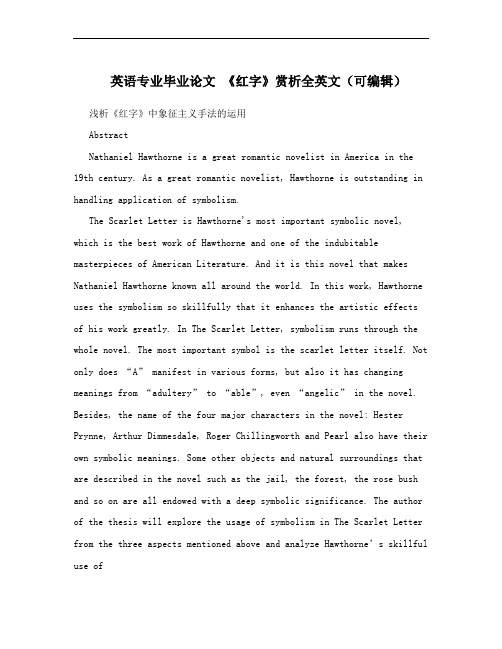
英语专业毕业论文《红字》赏析全英文(可编辑)浅析《红字》中象征主义手法的运用AbstractNathaniel Hawthorne is a great romantic novelist in America in the19th century. As a great romantic novelist, Hawthorne is outstanding in handling application of symbolism.The Scarlet Letter is Hawthorne's most important symbolic novel, which is the best work of Hawthorne and one of the indubitable masterpieces of American Literature. And it is this novel that makes Nathaniel Hawthorne known all around the world. In this work, Hawthorne uses the symbolism so skillfully that it enhances the artistic effects of his work greatly. In The Scarlet Letter, symbolism runs through the whole novel. The most important symbol is the scarlet letter itself. Not only does “A” manifest in various forms, but also it has changing meanings from “adultery” to “able”, even “angelic” in the novel. Besides, the name of the four major characters in the novel: Hester Prynne, Arthur Dimmesdale, Roger Chillingworth and Pearl also have their own symbolic meanings. Some other objects and natural surroundings that are described in the novel such as the jail, the forest, the rose bush and so on are all endowed with a deep symbolic significance. The author of the thesis will explore the usage of symbolism in The Scarlet Letter from the t hree aspects mentioned above and analyze Hawthorne’s skillful use ofsymbolism in The Scarlet LetterKey Words: the scarlet letter;symbolism;Hester Prynne;Pearl摘要纳撒尼尔?霍桑是十九世纪美国伟大的浪漫主义小说家。
认罪与隐罪:论《红字》中丁梅斯代尔的逃避心理机制

认罪与隐罪:论《红字》中丁梅斯代尔的逃避心理机制【摘要】在《红字》中,丁梅斯代尔是一个逃避责任和隐瞒真相的角色。
他内心充满了认罪的痛苦和对罪行的内疚感,但却选择了逃避和隐瞒。
本文通过分析丁梅斯代尔的认罪心理、隐罪行为和逃避心理机制,揭示了他内在的心理冲突和最终的后果。
总结了丁梅斯代尔的心理特征,探讨了逃避心理机制在社会中的影响,并展望了社会对逃避心理机制的应对措施。
通过深入研究丁梅斯代尔的角色,可以更好地理解人类的心理机制以及在面对罪行时的行为选择,对于社会正义和人类行为研究有着重要的启示意义。
【关键词】《红字》、丁梅斯代尔、认罪、隐罪、逃避心理机制、心理冲突、后果、心理特征、社会影响、应对措施1. 引言1.1 介绍论文的背景和目的《红字》是美国文学史上一部重要的文学作品,被视为美国文学的经典之一。
而其中的主要人物丁梅斯代尔,则是一个备受争议和关注的角色。
他既是一个背负着巨大罪恶的罪犯,同时又是一个心理复杂且充满逃避行为的人物。
本文旨在通过对丁梅斯代尔的心理进行探究,深入分析他的认罪与隐罪,揭示他的逃避心理机制,并探讨这种心理机制在社会中的影响。
通过对这一角色的深入解读,我们可以更好地理解人类心灵的复杂性,以及逃避心理机制在我们日常生活中的表现。
本文的目的是希望能够给读者提供一个新的视角,引起对逃避心理机制的思考,并探讨社会应对这一心理现象的可能措施。
通过对丁梅斯代尔的分析,我们可以更好地认识到人类内心的复杂性,以及逃避行为对个体和社会的影响。
1.2 概括丁梅斯代尔在《红字》中的角色及逃避行为丁梅斯代尔是《红字》中的一个重要角色,他是一个年轻的牧师,被描述为一个有着美丽外表和充满爱心的人。
他却有着一个深藏的秘密,即他与女主角海斯特·普林因有染。
丁梅斯代尔的逃避行为主要体现在他对自己的罪行的否认和掩饰上。
他试图通过慈善事业和传教活动来掩盖自己的罪恶,但内心却始终无法摆脱对自己罪行的深深内疚和压抑。
the scarlet letter chapter19 梗概

the scarlet letter chapter19 梗概
以下是一个大概的章节梗概:
在第十九章中,海丝特和Pearl 生活在一个与世隔绝的小茅屋中,尽管生活简朴,但她们却过着平静而满足的生活。
海丝特通过自己的手艺——刺绣,维持着生计。
她的手艺精湛,声名远扬,许多人都来找她制作纪念品或礼物。
然而,这种平静的生活被一个不速之客打破了。
一位年轻的牧师来到她们的小屋,他名叫亚瑟·丁梅斯代尔,是海丝特的前情人。
丁梅斯代尔因为内心的愧疚和痛苦,一直在寻找救赎。
他向海丝特坦白了自己的秘密,承认他是Pearl 的父亲。
海丝特对丁梅斯代尔的出现感到震惊和困惑,但她最终还是选择原谅他。
她明白丁梅斯代尔一直在为自己的罪过受苦,并且他现在愿意承担起父亲的责任。
在海丝特的鼓励下,丁梅斯代尔决定和她们一起生活,共同面对社会的偏见和指责。
这个章节展示了人物之间复杂的情感和关系,以及他们为了寻求救赎和接纳所做出的努力。
它也强调了宽容、理解和爱的力量,在困难和挫折面前,人们可以通过相互支持和原谅来找到内心的平静和幸福。
英语原著《红字》解读The Scarlet Letter

• 在霍桑撰写《红字》的同时,第一次妇女大会正好在纽约召开(1848)。在这次大会上, 女权主义者们提出了女性和男性拥有平等财产权的问题,指出女性“一旦结婚,在法律 的角度看如同死亡。他(丈夫)拿走了她所有的财产权,甚至是她所赚取的工资。”她 们提出女性应该和男性一样平等地工作,以便从经济的角度摆脱对男性的依附。
• 而此时的丁梅斯代尔牧师对齐灵渥斯却没有任何的怀疑,虽然他总是会感到有一种恶势 力在紧紧的盯着自己,总有一种不祥的预感,由于他不把任何人视为可信赖的朋友,故 此当敌人实际上已出现时,仍然辨认不出。就在丁梅斯代尔牧师饱尝肉体上的疾病的痛 苦和精神上的摧残的同时,他在圣职上却大放异彩,取得了辉煌的成就。公众的景仰更 加加重了他的罪恶感,使他的心理不堪重负。
• 许多年过去了,小珠儿已经七岁了,海丝特·白兰此时所处的地位已同她当初受辱时不 完全一样了。如果一个人在大家面前有着与众不同的特殊地位,而同时又不干涉任何公 共或个人的利益,她就最终会赢得普遍的尊重。海丝特·白兰从来与世无争,只是毫无 怨尤地屈从于社会的最不公平的待遇;她也没有因自己的不幸而希冀什么报偿;她同样 不依重于人们的同情。于是,在她因犯罪而丧失了权利、被迫独处一隅的这些年月里, 大大地赢得了人心。她除了一心一意的打扮小珠儿外,她还尽自己所能去帮助穷人,用 宽大的心去包容一切,人们开始不再把那红字看作是罪过的标记,而是当成自那时起的 许多善行的象征。
• 齐灵渥斯精心地实施着他的复仇计划,他利用丁梅斯代尔牧师敏感、富于想象的特点, 抓住他的负罪心理,折磨他的心灵,他把自己装扮成可信赖的朋友,让对方向他吐露一 切恐惧、自责、烦恼、懊悔、负罪感,那些向世界隐瞒着的一切内疚,本可以获得世界 的博大心胸的怜悯和原谅的,如今却要揭示给他这个内心充满了复仇火焰的人,最最恰 如其分地让他得偿复仇之夙债。
An Analysis of Symbolism in The Scarlet Letter 浅析《红字》中象征主义手法的运用

本科生毕业论文An Analysis of Symbolism in TheScarlet Letter浅析《红字》中象征主义手法的运用姓名学号专业指导教师An Analysis of Symbolism in The Scarlet LetterA Thesis Submitted toForeign Languages Department ofHenan University of Economics and Law inPartial Fulfillment of the Requirements for theDegree of Bachelor of ArtsByXXXSupervisor: XXXMay 30, 2011毕业论文开题报告AbstractNathaniel Hawthorne is a great romantic novelist in America in the 19th century. As a great romantic novelist, Hawthorne is outstanding in handling application of symbolism.The Scarlet Letter is Hawthorne’s most important symbolic novel, which is the best work of Hawthorne and one of the indubitable masterpieces of American Literature. And it is this novel that makes Nathaniel Hawthorne known all around the world. In this work, Hawthorne uses the symbolism so skillfully that it enhances the artistic effects of his work greatly. In The Scarlet Letter, symbolism runs through the whole novel. The most important symbol is the scarlet letter itself. Not only does ―A‖ manifest in various forms, but also it has changing meanings from ―adultery‖ to ―able‖, even ―a nge lic‖ in the novel. Besides, the name of the four major characters in the novel: Hester Prynne, Arthur Dimmesdale, Roger Chillingworth and Pearl also have their own symbolic meanings. Some other objects and natural surroundings that are described in the novel such as the jail, the forest, the rose bush and so on are all endowed with a deep symbolic significance. The author of the thesis will explore the usage of symbolism in The Scarlet Letter from the three aspects mentioned above and analyze Hawthorne’s sk illful use of symbolism in The Scarlet Letter.Key Words: the scarlet letter;symbolism;Hester Prynne;Pearl摘要纳撒尼尔·霍桑是十九世纪美国伟大的浪漫主义小说家。
英语专业论文 霍桑与红字象征手法的运用
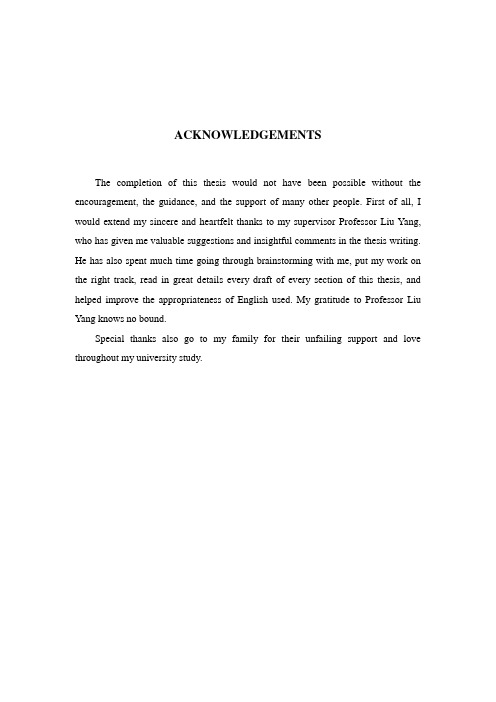
ACKNOWLEDGEMENTSThe completion of this thesis would not have been possible without the encouragement, the guidance, and the support of many other people. First of all, I would extend my sincere and heartfelt thanks to my supervisor Professor Liu Yang, who has given me valuable suggestions and insightful comments in the thesis writing. He has also spent much time going through brainstorming with me, put my work on the right track, read in great details every draft of every section of this thesis, and helped improve the appropriateness of English used. My gratitude to Professor Liu Yang knows no bound.Special thanks also go to my family for their unfailing support and love throughout my university study.CONTENTSACKNOWLEDGEMENTSAbstract(in English) (1)Abstract(in Chinese) (1)I.Introduction (1)1.1 The Brief Introduction of the Story (2)1.2 An Introduction to the Author (2)1. 2.1 The Author’s Growth and Main Works (2)1.2.2 The Fame of the Author (3)1.3 Background (3)1.3.1 Social Background of the 17th Century (3)1.3.2 The Purita nism in America (4)II.Symbolism (4)2.1 The Definition of Symbolism (4)2.2 The Form of Symbolism (4)III. The Use of Symbolism in the Scarlet Letter (5)3.1 Different Meanings of the Scarlet Letter “A” (5)3.2 Symbolism Names of Characters (7)3.2.1 Hester Prynne (7)3.2.2Pearl (8)3.2.3 Roger Chillingworth (9)3.2.4 Reverend Arthur Dimmesdale (9)3.3 Symbolic Natural Environment and Objects Described in the Novel (10)3.3.1 Red Bird (10)3.3.2 Light and Darkness (10)3.3.3 Prison and scaffold (11)3.3.4 The Forest and the Stream (12)IV. The Influence of Symbolism in America Literature (12)V.Conclusion (12)BIBLIOGRAPHY (14)DECLARATIONHawthorne and the Use of Symbolism in the Scarlet LetterAbstract:Nathaniel Hawthorne is a great romantic novelist as well as distinguished forerunner of symbolism in the nineteenth century in America. The Scarlet Letter is American writer Nathaniel Hawthorne’s famous work. Hawthorne’s symbolism usage was displayed so well, that it makes the Scarlet Letter known all around the world. It is regard as the first symbolic novel in American literature because of the ingenious using of symbolism. This thesis mainly concentrates on symbolism. The novel revolves around one major symbol the scarlet letter. Besides, some other environments that are described in the novel have their symbolic meaning. At the same time, the instruction to the author’s growth and his own major works. The influence of this novel on Romance period,and the author’s use of symbolism.Key words: The scarlet letter; symbolism; Nathaniel Hawthorne; the use of symbolism摘要:霍桑是一位伟大的浪漫主义小说家,同时也十九世纪杰出的象征主义先驱。
红字主要人物分析英文
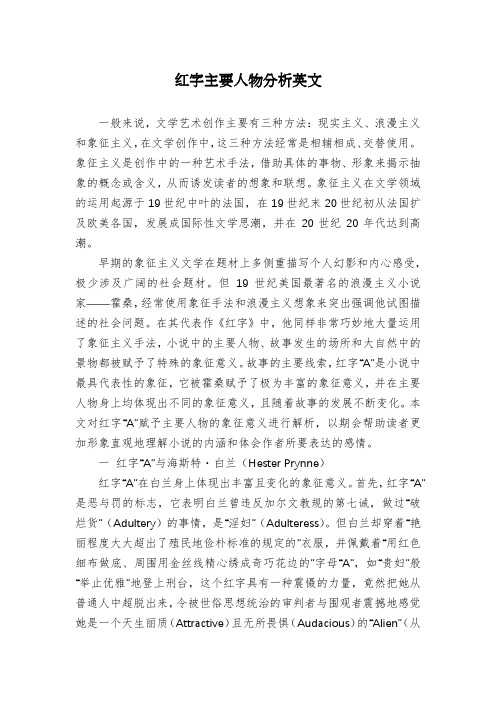
红字主要人物分析英文一般来说,文学艺术创作主要有三种方法:现实主义、浪漫主义和象征主义,在文学创作中,这三种方法经常是相辅相成、交替使用。
象征主义是创作中的一种艺术手法,借助具体的事物、形象来揭示抽象的概念或含义,从而诱发读者的想象和联想。
象征主义在文学领域的运用起源于19世纪中叶的法国,在19世纪末20世纪初从法国扩及欧美各国,发展成国际性文学思潮,并在20世纪20年代达到高潮。
早期的象征主义文学在题材上多侧重描写个人幻影和内心感受,极少涉及广阔的社会题材。
但19世纪美国最著名的浪漫主义小说家――霍桑,经常使用象征手法和浪漫主义想象来突出强调他试图描述的社会问题。
在其代表作《红字》中,他同样非常巧妙地大量运用了象征主义手法,小说中的主要人物、故事发生的场所和大自然中的景物都被赋予了特殊的象征意义。
故事的主要线索,红字“A”是小说中最具代表性的象征,它被霍桑赋予了极为丰富的象征意义,并在主要人物身上均体现出不同的象征意义,且随着故事的发展不断变化。
本文对红字“A”赋予主要人物的象征意义进行解析,以期会帮助读者更加形象直观地理解小说的内涵和体会作者所要表达的感情。
一红字“A”与海斯特・白兰(Hester Prynne)红字“A”在白兰身上体现出丰富且变化的象征意义。
首先,红字“A”是恶与罚的标志,它表明白兰曾违反加尔文教规的第七诫,做过“破烂货”(Adultery)的事情,是“淫妇”(Adulteress)。
但白兰却穿着“艳丽程度大大超出了殖民地俭朴标准的规定的”衣服,并佩戴着“用红色细布做底、周围用金丝线精心绣成奇巧花边的”字母“A”,如“贵妇”般“举止优雅”地登上刑台,这个红字具有一种震慑的力量,竟然把她从普通人中超脱出来,令被世俗思想统治的审判者与围观者震撼地感觉她是一个天生丽质(Attractive)且无所畏惧(Audacious)的“Alien”(从另一世界来的生物)。
白兰的命运是坎坷的,年轻率直的她与年老阴险的齐灵渥斯的婚姻有悖于人伦道德,如同“一个含苞的青春同朽木错误地、不自然地嫁接在一起”。
《红字》象征,文献综述

《红字》中象征主义的运用的文献综述摘要:纳撒尼尔·霍桑是十九世纪美国伟大的浪漫主义小说家。
作为一位伟大的浪漫主义小说家,霍桑对象征主义手法的运用可以说是独具匠心。
长篇小说《红字》是霍桑重要的象征主义代表作品,无疑也是美国文学浪漫主义时期最著名的作品之一。
也正是这部巨著使得霍桑誉满全球。
龚翰熊在现代西方文学思潮中认为,“作者巧妙的运用了象征主义手法,加强了作品的艺术效果。
”整篇作品象征主义手法贯穿始终。
其中,作重要的要数红字“A”本身的象征意义。
它不仅以各种各样的形式出现,而且其象征意义不断变化,从“通奸”到“有能力的”甚至“天使般的”。
此外,小说中四个主要角色:海斯特,丁梅斯代尔,齐灵沃尔斯,珠儿也都有其各自的象征意义。
小说描述的景物和场景,例如监狱,森林,玫瑰花园等等也都寓意深刻。
本文正是从这几方面着手,探究作者在小说中对象征主义手法的巧妙运用。
关键词: 红字;霍桑;“A”;象征主义介绍《红字》是美国19世纪影响最大的小说,享利·詹姆斯曾说《红字》是“本世纪最优秀的富有幻想力的小说”。
董衡巽在美国文学简史(上册)提到:“它是道德的代表,还是非道德的象征;是对清教道德规范的抨击,还是对它的赞颂,作者似乎没有对人物的褒贬,除了宗教戒规外,没有行为是非界限。
”霍桑的小说多采用象征手法, 要归因于他思想中神秘主义的影响, 正如英美文学评论家朱虹所说:“在霍桑的作品中, 最常见的一个现象就是:由于作家的主观精神的照射, 客观事物既是它自己, 同时又是别的什么。
吴亮在象征主义小说说:“客观物质世界仅仅是假象,而它的‘灵性’才是本质。
”他说,‘一切都是灵性, 就好比灵魂与躯体的关系一样。
’”[3]这种观点决定了霍桑在创作中不对客观事物作真实的描摹, 而是借象征去揭示客观事物背后的隐秘含义。
下面我们来看一看在《红字》中霍桑是如何运用象征手法来揭示小说的丰富内涵的。
(一)“红字”的象征意义充满象征意义与神秘色彩的红色 A 字几乎贯穿小说的每一个场景, 连结着小说中的所有人物。
小说《红字》中红色的象征意义
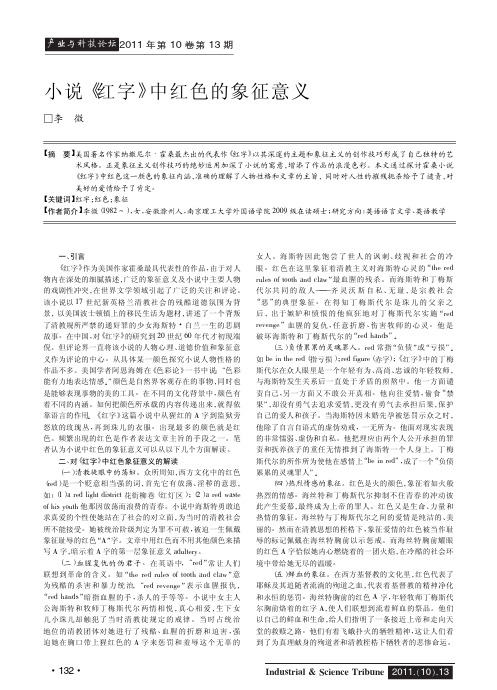
女人。海斯特 因 此 饱 尝 了 世 人 的 讽 刺、歧 视 和 社 会 的 冷 眼。红色在这里象征着清教主义对海斯特心灵的“the red rules of tooth and claw”最血腥的残杀。而海斯特和丁梅斯 代尔共 同 的 敌 人———齐 灵 沃 斯 自 私、无 耻,是 宗 教 社 会 “恶”的典型 象 征。 在 得 知 丁 梅 斯 代 尔 是 珠 儿 的 父 亲 之 后,出于嫉妒和 愤 恨 的 他 疯 狂 地 对 丁 梅 斯 代 尔 实 施“red revenge”血腥的 复 仇,任 意 折 磨、伤 害 牧 师 的 心 灵。他 是 破坏海斯特和丁梅斯代尔的“red hands”。
( 五) 鲜血的象征。在西方基督教的文化里,红色代表了 耶稣及其追随者流淌的殉道之血,代表着基督教的精神净化 和永恒的惩罚。海丝特胸前的红色 A 字,年轻牧师丁梅斯代 尔胸前烙着的红字 A,使人们联想到流着鲜血的祭品。他们 以自己的鲜血和生命,给人们指明了一条接近上帝和走向天 堂的救赎之路。他们有着飞蛾扑火的牺牲精神,这让人们看 到了为真理献身的殉道者和清教桎梏下牺牲者的悲惨命运。
( 三) 负债累累的灵魂罪人。red 常指“负债”或“亏损”。 如 be in the red( 指亏损) ; red figure( 赤字) ; 《红字》中的丁梅 斯代尔在众人眼里是一个年轻有为、高尚、忠诚的年轻牧师, 与海斯特发生关系后一直处于矛盾的煎熬中。他一方面谴 责自己,另 一 方 面 又 不 敢 公 开 真 相。 他 向 往 爱 情,偷 食“禁 果”,却没有勇气 去 追 求 爱 情,更 没 有 勇 气 去 承 担 后 果,保 护 自己的爱人和孩子。当海斯特因未婚先孕被惩罚示众之时, 他除了自言自语式的虚伪劝戒,一无所为。他面对现实表现 的非常懦弱、虚伪和自私。他把理应由两个人公开承担的罪 责和抚养孩子的重任无情推到了海斯特一个人身上。丁梅 斯代尔的所作所为使他在感情上“be in red”,成了一个“负债 累累的灵魂罪人”。
《红字》象征意义解读

《红字》象征意义解读摘要美国著名小说家纳撒尼尔·霍桑的代表作《红字》,是美国第一部象征主义小说。
本文着重从红字“a”、人物及场景描述三个方面来解读小说中的象征意义,深刻剖析了作者的清教观,同时也揭露了当时的社会制度与传统道德观念对人性的压抑与迫害。
关键词:纳撒尼尔·霍桑象征意义红字“a”中图分类号:i106.4 文献标识码:a象征,是文学创作的一种艺术手法,通过借助具体的事物来表现抽象的意义,诱发读者的想象和联想,从而来表达作者所要表现的某种思想、感情、意志或者观点。
象征是美国著名小说家纳撒尼尔·霍桑运用得最为娴熟的艺术手法之一。
面对各种事物和现象,他总是思索其中更深一层的意义,挖掘它们所代表的精神内涵或更高层次的真理。
其代表作《红字》创作于1851年,是整个美国浪漫主义小说中最有声望的权威作品之一,它在思想内容和艺术手法上独具一格,寓意深刻,尤以象征手法表现得最为淋漓尽致,因此,也被称为美国第一部象征主义小说。
《红字》描述了17世纪中叶发生在北美清教殖民统治下的新英格兰的一幕爱情悲剧。
年轻漂亮的海斯特·白兰嫁给了一个畸形的年老学者罗格·齐灵渥斯。
丈夫被俘虏失踪后,海斯特和一个年轻的牧师阿瑟·丁梅斯代尔暗中相爱,并生下了一个女孩儿——珠儿。
犯了通奸罪的海斯特遭到了胸前佩戴红“a”字的惩罚。
而齐灵渥斯潜回美洲处心积虑地折磨丁梅斯代尔。
最终海斯特因自己的美好德行获得了人们的谅解,而丁梅斯代尔在当众袒露了自己的罪责后死去。
这是一个讨论罪与罚及救赎的故事。
霍桑在这部小说中用充满象征的奇异图景构成了一个真实与想象、现实与幻想的混合世界。
本文着重从红字“a”、人物及场景描述三个方面来探讨小说中的象征手法。
一红字——“a”霍桑巧妙地把红字“a”贯穿整个小说,始终让它在不同的地点以不同的形式出现,像一道红线,连结起书中所有的人物和场景,是全书寓意丰富的核心象征。
丁梅斯代尔的忏悔与救赎——霍桑的《红字》
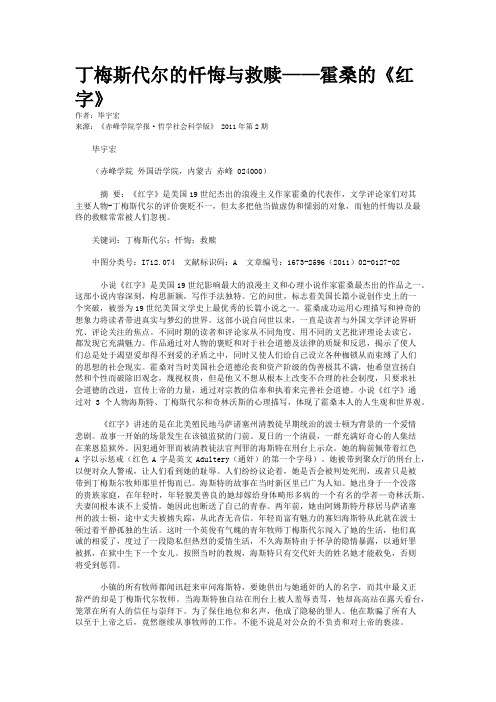
丁梅斯代尔的忏悔与救赎——霍桑的《红字》作者:毕宇宏来源:《赤峰学院学报·哲学社会科学版》 2011年第2期毕宇宏(赤峰学院外国语学院,内蒙古赤峰 024000)摘要:《红字》是美国19世纪杰出的浪漫主义作家霍桑的代表作,文学评论家们对其主要人物-丁梅斯代尔的评价褒贬不一,但太多把他当做虚伪和懦弱的对象,而他的忏悔以及最终的救赎常常被人们忽视。
关键词:丁梅斯代尔;忏悔;救赎中图分类号:I712.074 文献标识码:A 文章编号:1673-2596(2011)02-0127-02小说《红字》是美国19世纪影响最大的浪漫主义和心理小说作家霍桑最杰出的作品之一。
这部小说内容深刻,构思新颖,写作手法独特。
它的问世,标志着美国长篇小说创作史上的一个突破,被誉为19世纪美国文学史上最优秀的长篇小说之一。
霍桑成功运用心理描写和神奇的想象力将读者带进真实与梦幻的世界。
这部小说自问世以来,一直是读者与外国文学评论界研究、评论关注的焦点。
不同时期的读者和评论家从不同角度、用不同的文艺批评理论去读它,都发现它充满魅力。
作品通过对人物的褒贬和对于社会道德及法律的质疑和反思,揭示了使人们总是处于渴望爱却得不到爱的矛盾之中,同时又使人们给自己设立各种枷锁从而束缚了人们的思想的社会现实。
霍桑对当时美国社会道德沦丧和资产阶级的伪善极其不满,他希望宣扬自然和个性而破除旧观念,蔑视权贵,但是他又不想从根本上改变不合理的社会制度,只要求社会道德的改进,宣传上帝的力量,通过对宗教的信奉和执着来完善社会道德。
小说《红字》通过对3个人物海斯特、丁梅斯代尔和奇林沃斯的心理描写,体现了霍桑本人的人生观和世界观。
《红字》讲述的是在北美殖民地马萨诸塞州清教徒早期统治的波士顿为背景的一个爱情悲剧。
故事一开始的场景发生在该镇监狱的门前。
夏日的一个清晨,一群充满好奇心的人集结在莱恩监狱外。
因犯通奸罪而被清教徒法官判罪的海斯特在刑台上示众。
她的胸前佩带着红色A字以示惩戒(红色A字是英文Adultery(通奸)的第一个字母)。
丁梅斯德心头的红字--解读《红字》(英文)
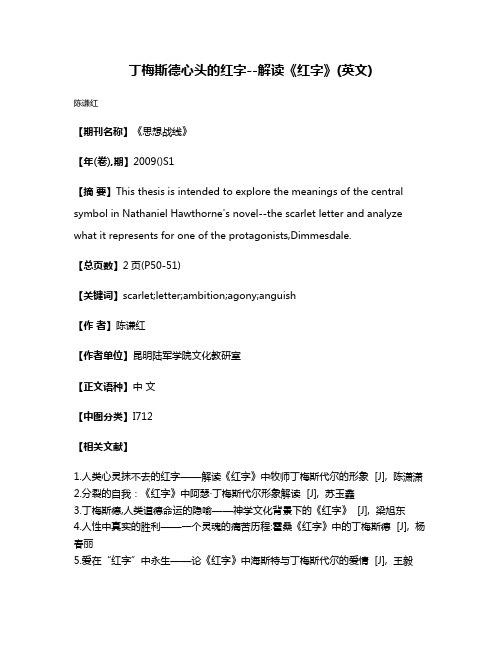
丁梅斯德心头的红字--解读《红字》(英文)
陈谦红
【期刊名称】《思想战线》
【年(卷),期】2009()S1
【摘要】This thesis is intended to explore the meanings of the central symbol in Nathaniel Hawthorne's novel--the scarlet letter and analyze what it represents for one of the protagonists,Dimmesdale.
【总页数】2页(P50-51)
【关键词】scarlet;letter;ambition;agony;anguish
【作者】陈谦红
【作者单位】昆明陆军学院文化教研室
【正文语种】中文
【中图分类】I712
【相关文献】
1.人类心灵抹不去的红字——解读《红字》中牧师丁梅斯代尔的形象 [J], 陈潇潇
2.分裂的自我:《红字》中阿瑟·丁梅斯代尔形象解读 [J], 苏玉鑫
3.丁梅斯德,人类道德命运的隐喻——神学文化背景下的《红字》 [J], 梁旭东
4.人性中真实的胜利——一个灵魂的痛苦历程:霍桑《红字》中的丁梅斯德 [J], 杨春丽
5.爱在“红字”中永生——论《红字》中海斯特与丁梅斯代尔的爱情 [J], 王毅
因版权原因,仅展示原文概要,查看原文内容请购买。
认罪与隐罪论《红字》中丁梅斯代尔的逃避心理机制

138068 心理学论文认罪与隐罪:论《红字》中丁梅斯代尔的逃避心理机制霍桑在小说创作过程中,“最关心的是人的心灵。
在他一生出版的五部长篇小说中,‘心灵’一词便出现585次”[1]。
霍桑在对人心理的探索中,认为“人心皆有罪”,并且致力于表现人心深处的“恶”、“罪”及其对人心灵的影响。
在其代表作《红字》中,霍桑就对丁梅斯代尔(以下简称丁)犯罪后遭受巨大痛苦的心灵进行了艺术化表现。
丁和海丝特犯了通奸罪之后,认罪和隐罪就纠缠在丁心里打成一个解不开的死结,这使他时刻遭受着两种形式的精神分裂:“其一,他与周围世界的关系出现了分裂;其二,他与自身关系出现了分裂”[2]。
这样,丁的自身存在便被分离为“身体化的自我”和“非身体化的自我”[2],即在公众面前以神圣的牧师形象出现的假自我和由于罪感而陷入自责和自虐的真自我,这导致他体验着“心身分离”[2]的剧烈痛苦。
因此,要研究丁的生命感受,我们有必要对他独特的心路历程进行分析。
自《红字》1850年发表以来,研究者们已从不同的视角对丁进行了分析和解读,如伦理身份对丁的影响,丁的圣经人物原型,弗洛伊德、荣格等心理和精神分析视角下的丁等。
但这些研究都没有充分地解释如下两个问题:首先,丁作为一个有自由意志的个体,为什么犯罪后在隐罪和认罪之间徘徊了七年才选择当众悔罪?其次,为什么丁认罪后又要一死了之?本文借鉴弗洛姆的逃避心理机制,通过具体的文本分析,将丁置于特定的历史境遇分析他犯罪后的心理的矛盾、孤独与恐惧。
一、遁入自虐,屈从权威在小说的第三章,丁在威尔逊先生的推搡中出现在新英格兰人和读者的视野中。
丁一出场就带有明显的存在性不安,“他的嘴除非用力闭着,总是不停地颤抖着”[3]。
犯罪后丁的真自我无法正大光明地应对充满威胁的现实世界,因而与身体逐渐分离,并萎缩为非身体化的“内自我”,残暴地统治着身体化自我,这使得丁“总是种忧心忡忡、恍恍惚惚、惊慌失措”[3]。
接下来的七年里,在丁真自我的强势压迫下,他开始习惯将手放在胸口上,以这种强迫仪式和思想自我折磨。
在完美与分裂之间的挣扎——析《红字》主人公丁梅斯代尔的悲剧
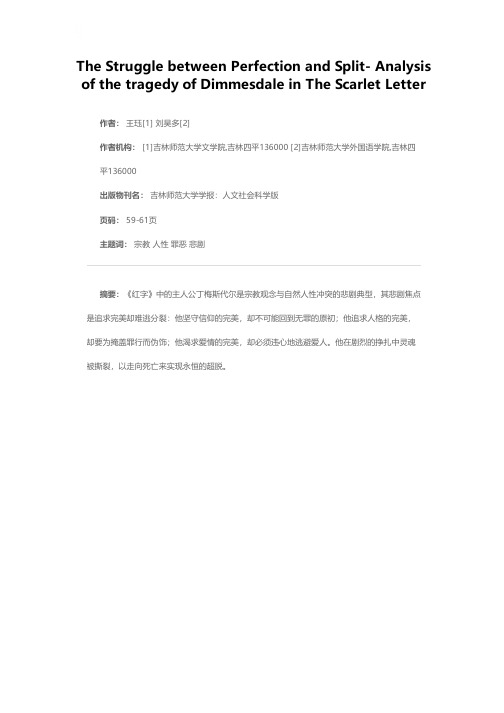
The Struggle between Perfection and Split- Analysis of the tragedy of Dimmesdale in The Scarlet Letter 作者: 王珏[1] 刘昊多[2]
作者机构: [1]吉林师范大学文学院,吉林四平136000 [2]吉林师范大学外国语学院,吉林四
平136000
出版物刊名: 吉林师范大学学报:人文社会科学版
页码: 59-61页
主题词: 宗教 人性 罪恶 悲剧
摘要:《红字》中的主人公丁梅斯代尔是宗教观念与自然人性冲突的悲剧典型,其悲剧焦点是追求完美却难逃分裂:他坚守信仰的完美,却不可能回到无罪的原初;他追求人格的完美,
却要为掩盖罪行而伪饰;他渴求爱情的完美,却必须违心地逃避爱人。
他在剧烈的挣扎中灵魂
被撕裂,以走向死亡来实现永恒的超脱。
- 1、下载文档前请自行甄别文档内容的完整性,平台不提供额外的编辑、内容补充、找答案等附加服务。
- 2、"仅部分预览"的文档,不可在线预览部分如存在完整性等问题,可反馈申请退款(可完整预览的文档不适用该条件!)。
- 3、如文档侵犯您的权益,请联系客服反馈,我们会尽快为您处理(人工客服工作时间:9:00-18:30)。
The necessity for Dimmesdale to confess in public[Abstract]: In Hawthorne's The Scarlet Letter, the minister's public confession on the day of the Governor's inauguration brings the whole story to its tragic end. The text will try to analyze the necessity for Dimmesdale to confess in public from three motivations: the minister's belief, guilt and selfhood, Pearl’s demand of public recognition and the discourse with Hester in the forest.[Keywords]: The Scarlet Letter, confession, necessityAs one of the greatest novels in American literature of the 19th century, Hawthorne's The Scarlet Letter has been studied for many years at home and abroad. Studies of this novel in China focus on the following aspects:Firstly, there are thematic analyses from the viewpoint of religious ethics, feminism and human nature; secondly, in terms of writing techniques, many studies pay attention to the symbolic meaning of the text especially the meaning of the letter A; thirdly, scholar also compare The Scarlet Letter with other novels such as The Thorn Birds; fourthly, studies of the protagonists' personality characteristics are of great quantity. Foreign studies include Hawthorne's aesthetic theory, political views, and concept of ″Romance″, etc. As for one of the protagonists –Dimmesdale, his personality characteristics and tragic interest the scholars most. However, there are not many studies specifically about the motivations and reasons for Dimmesdale's confession in the end. This paper will try to analyze the necessity for Dimmesdale to confess in public: it is the minister's belief, guilt and selfhood, Pearl’s demand of public recognition and the discourse with Hester in the forest leads to Dimmesdale's inevitable final act.1.Dimmesdale's belief, guilt and personality characteristics1)Dimmesdale's genuine devotion to GodAs a devoted servant of God, he believed that only God could save him and all he wanted was God's forgiveness. His concealment of sin resulted from hisself-deceiving perception that he still had a means of salvation through supporting and guarding his parishioners and that he would be able to ″confess his guilt from his pulpit and yet seem to his congregation be declaring the guiltiness of all man rather than confessing his own″(Katz, "Character," "Nature,", 10). However, ″Hawthorne's Bostonians believe that a sinner can only absolve himself of sin, God willing, by making public confession″ (Granger, Arthur Dimmesdale as Tragic Hero, 198). It is no doubt that he knew his could only bring an end to his hypocrisy and get his salvation by making public confession from the very beginning. When he was dying, he said to Hester that if they forgot God, they would have no hope to meet again. ″Thanks to Him who hath led me hither! …God knows; and he is merciful! ... Praise his name″! Died with God's salvation, he was content with being allowed to continuing serving in the other world.2)Dimmesdale's self-torture out of his guiltFrom the moment that Hester stood on the scaffold, Dimmesdale was tortured by his guilt. His cheek became paler and thinner, and his voice more tremulous than before. Pressing his hand over his heart even became his habit especially he was reminded of his sin. At the same time, he achieved popularity as a minister because his gift of communication and perception was strengthened by his own anguish and suffering, which gave him the ability to relieve his parishioners' pain. However, the more they worshiped him, the more he was tortured by his lie and concealment. Unluckily he was the one who hated lies most so he used a bloody scourge to lash his own shoulders, fasted as an act of penance and kept vigil night after night. After seven year’s self-torture, he was desperate to end this falsehood.3)Dimmesdale's selfhoodDimmesdale chose to confess in public for his own sake. At first, he believed that ″I f he confess his crime, his world will be lost, all that make sense to him is the helping of his fellow man ″(Donnell, Hawthorne and Dimmesdale, 320). so he concealed everything. He could not bear the thought of becoming useless. At the beginning, in order to remain his respected image and fulfill his own demand to serve God, he betrayed Hester and Pearl. Again, he finally chose to make a publicconfession for he himself was desirous to be forgiven by God.2.Pearl’s demand of public recognitionIn the forest, when Pearl was asked by his mother to come to the minister, she was reluctant because she felt that somehow her place beside Hester was now occupied by the minister. She refused to speak directly to Dimmesdale and kept asking Hester questions such as: ″ Does he love us? Will he go back with us, hand in hand, we three together, into the town ″? ″Public revelation of the real relationship among the three is to Pearl the only means of reconciliation″(McNamara, The Character of Flame, 541). Dimmesdale had felt his daughter's demand and was also disturbed by Pearl's cries when she found Hester not wearing the scarlet letter and by her washing off his unwelcomed kiss. For the purpose of allowing the supernatural child to ″grow up amid human joy and sorrow, nor forever do battle with the world, but be a woman in it″ and fulfill Pearl’s demand of public recognition, Dimmesdale was motivated to confess in public.3.Dimmesdale's discourse with Hester in the forest1)Chillingworth's identity was revealed.To tell Dimmesdale that Chillingworth who lived with him day and night was her husband was the initial intention for Hester to wait for Dimmesdale in the forest. Shocked by the miserable fact, he suddenly understood his repugnance to his physician. ″T here was never a blacker or fiercer frown than now″showed that the blow seemed to almost ruin his already collapsing world –″It is this revelation that affects Chillingworth more powerfully than anything else. For the first time, he decided on an action of some sort ″(Sampson, Motivation, 512). Continuing living with his enemy to Dimmesdale was something horrible than death; therefore he did not want to give himself up to the villainous and ugly physician and made up his mind to fight for his own freedom somehow. Although he was tempted by Hester's escape plan, he always knew his salvation could only be achieved by public confession. ″Chillingworth symbolizes that force within the Christian pilgrim which prompts him to conceal his sin from the world″(Granger, Arthur Dimmesdale as Tragic Hero, 199). Dimmesdale resolved to escape him.2)Hester's escape plan gave Dimmesdale strength.After his discourse with Hester, Dimmesdale was changed into another person, more energetic, more steadfast. His ″acceptance of Hester's proposal opened a breach in his already seriously weakened character″ (Katz, "Character," "Nature," 12). Seven years' physical and moral deterioration made him fear to take any actions. Encountered with Chillingworth' menace, his first thought was God had made his judgement and he would better die. Only Hester's was strong enough to tell him what to do and where to go. On impulse, the minister accepted the seemingly feasible escape plan, though subconsciously he did not really want to. At least, the status quo and the balance were changed, which made it possible for the minster's yearning final act.The minister's decision of public confession did not come from nowhere. When Hester stood on the scaffold, with Pearl in her hand, enduring all the contempt and criticisms on her own, Dimmesdale knew how the story would end – he owned his family and the world a public confession. What the Seven years' procrastination brought was endless guilt, anguish and hurt. The minster' necessary final act on the scaffold kill two birds with one stone: achieve his unity with his family spiritually and most importantly, his devotion to God.BibliographySeymour Katz, "Character," "Nature," and Allegory in The Scarlet Letter [J]. Nineteenth-Century Fiction, 1968 (1), pp. 3-17.Bruce Ingham Granger, Arthur Dimmesdale as Tragic Hero [J]. Nineteenth-Century Fiction, 1964 (2), pp. 197-203.Charles R. O'Donnell. Hawthorne and Dimmesdale: The Search for the Realm of Quiet [J].Nineteenth-Century Fiction, 1960 (4), pp. 317-332.Anne Marie McNamara. The Character of Flame: The Function of Pearl in The Scarlet Letter [J]. American Literature, 1956 (4), pp. 537-553.Edward C. Sampson. Motivation in The Scarlet Letter [J]. American Literature, 1957 (4), pp. 511-513.。
